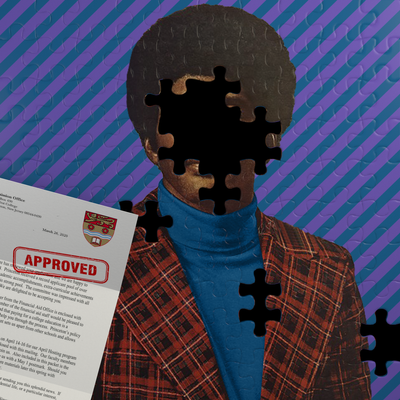
This column first ran in John Paul Brammer’s Hola Papi newsletter, which you can subscribe to on Substack.
¡Hola, Papi!
I live in a town of rich white people and poor Latinx people. While my high school was majority Latinx, in the classes I took I was usually the only person of color. I’m a Latino who can understand Spanish but has a crap accent when speaking it. My family’s socioeconomic status made me feel like an outsider to the white kids who could afford to do extravagant things after school. Taking advanced classes, I became friends with the white people around me, but my melanin made me feel like I could never truly fit in.
I joined advanced classes late because I was forced into ESL classes. I felt like I was catching up with the white kids who had been in those classes the whole time. These kids looked down on me when I didn’t know as much as them. Even when I finally caught up to them they would either insult me or ignore the fact that I was there. At a certain point, I tried channeling these negative emotions into anger to fuel myself to become better. Every single time I beat them in a test or quiz or anything graded I knew that I deserved to be there. I ended high school this year ranking above most of my peers and am even going to one of the top 20 universities in the country.
My problem is I don’t think I will be able to continue like this. Deep down, I know I deserve my spot at the university, but I’ve heard from so many people that I only got in because of affirmative action that I’m starting to be convinced. My future peers will be just as smart as I am, but with more accomplishments. I don’t know if I can continue using my grades as a way to handle my problems. And even if it works in college, it won’t work in the real world. I don’t feel like I’m good enough to be where I’m at. I know comparing myself to others is not what I should be doing, but what can I do?
Signed,
Imposter
Hi there, Imposter!
My mom was my high-school English teacher my freshman year. This was fine, albeit embarrassing at times (she was much more popular than I was), but then I made the mistake of being good at writing.
I won some essay contests and started getting attention for it. My name was even on the after-school announcements! Pretty sick. Then, when college application season came around, I landed a big one: I got into Duke. That was a huge deal in my neck of the woods. Not Ivy League or anything, but, well, I still don’t know what that term even means.
All throughout that experience, beginning to end, there was this pernicious rumor that my mom was writing everything for me, and then, when I got into a “good school,” that I had only gotten in because I was “a Mexican.” Joke’s on them, huh? My mom is still writing everything, including this column, and I’m still reaping all the benefits of being a Mexican, like this absolute dump truck culo. Kidding, kidding, es broma. Not every Mexican has that, of course.
But I do.
Point is, every accomplishment I made, every inch of progress I took, there was always someone waiting in the wings to cast doubt on it. I understand where you’re coming from, because I’ve tried overcompensating too. I realized early on that I would have to be better than good. I would have to be great. I would have to be so great that surely no one would ever look at me and think, “He’s not the real deal.”
But over time and after much exhaustion, Imposter, I realized something: I was trying to beat someone else’s game, and that game had absolutely zero interest in me as a person. I was trying to drink from a mirage: that elite institutions were in any way qualified to assess my worth, that being “as white” as the white kids was going to do a damn thing for me, that the systems I’d been plopped into could meaningfully reward me.
I know what I’m supposed to say here, Imposter. I’m supposed to say, “Think like a straight white guy.” Carry yourself with his confidence, tackle things like he would tackle them, believe in yourself like he believes in himself. And, sure, I think there are some benefits to dabbling in that. But on the whole, it’s never really worked for me, and here’s why.
For one, I’m simply not a straight white man and I don’t think putting myself in the mind-set of one is going to cure my imposter syndrome. That sounds like adding another layer of fraud, if anything. For two, I simply don’t think the typical “straight white man” is even “confident,” per se. I just think he, more so than others, probably hasn’t run into the same obstacles. That’s not confidence. That’s reckless, unearned optimism.
I have more of these! For three: I would rather not think or act like a person who would do well in this heinous system, be they white or male or anything else. It’s a mind-set, not an identity, and I think that mindset has wrought havoc on the delicate balance of this world à la Fire Lord Ozai in Avatar. There’s a topical reference for you. I watch TV shows.
For four! I have this theory that under capitalism, we’re all imposters and the people we see as competent have merely made peace with the reality that you can’t bring your whole self, your compassion, your gentleness, your humanity, into the fighting pit. So often, people are rewarded for prioritizing profits at the expense of others with less power. I don’t think any of us should be aiming for that, even if we’d be the first queer brown person in any given institution to do it.
“But!” You shriek at me, noticing the weakness in my otherwise perfect, possibly award-winning screed. “That’s not necessarily what confidence is! When we say ‘think like a white man,’ we don’t mean become him. We just mean you should doubt yourself less.”
And you know what? I agree. Here’s what I want for you, Imposter. I want you to stop privileging your critics in the deliberation room in your head. I want you to feel competent, worthy, and comfortable. I want you to walk into a room and, even if it’s full of faces that look nothing like yours, know that you belong there.
I just think that, to get there, you have to throw away this mind-set that arranges humans into hierarchies. I want you to stop thinking about being good enough for this university. This university is lucky to have you. You should be thinking about what it can do for you instead, about what tools it can provide you with to build the life and the kind of world you want to live in.
And when you think of that world, Imposter, I hope you can imagine one beyond the one we’re in, where the only difference is that you’re closer to the top of it. I hope you imagine one where you’re not just, essentially, a brown white dude, but one where you’re in community with the people that are pushed to the bottom in the process of configuring society into a pyramid.
A lot of life is performance. A lot of life is having to put on a certain face, entering a room, and showing off the parts of you that will get rewarded while minimizing the parts that, for one reason or another, get punished. That’s reality. You’re not fake for having to do that. I just hope that, when they let you through into the next room, you make sure to leave the door behind you wide open.
Con mucho amor,
Papi
Originally published on July 23, 2020.
This column first ran in John Paul Brammer’s Hola Papi newsletter, which you can subscribe to on Substack. Purchase JP Brammer’s book Hola Papi: How to Come Out in a Walmart Parking Lot and Other Life Lessons, here.





